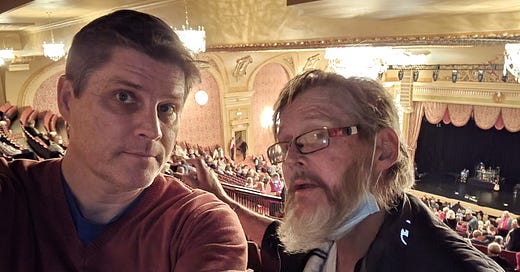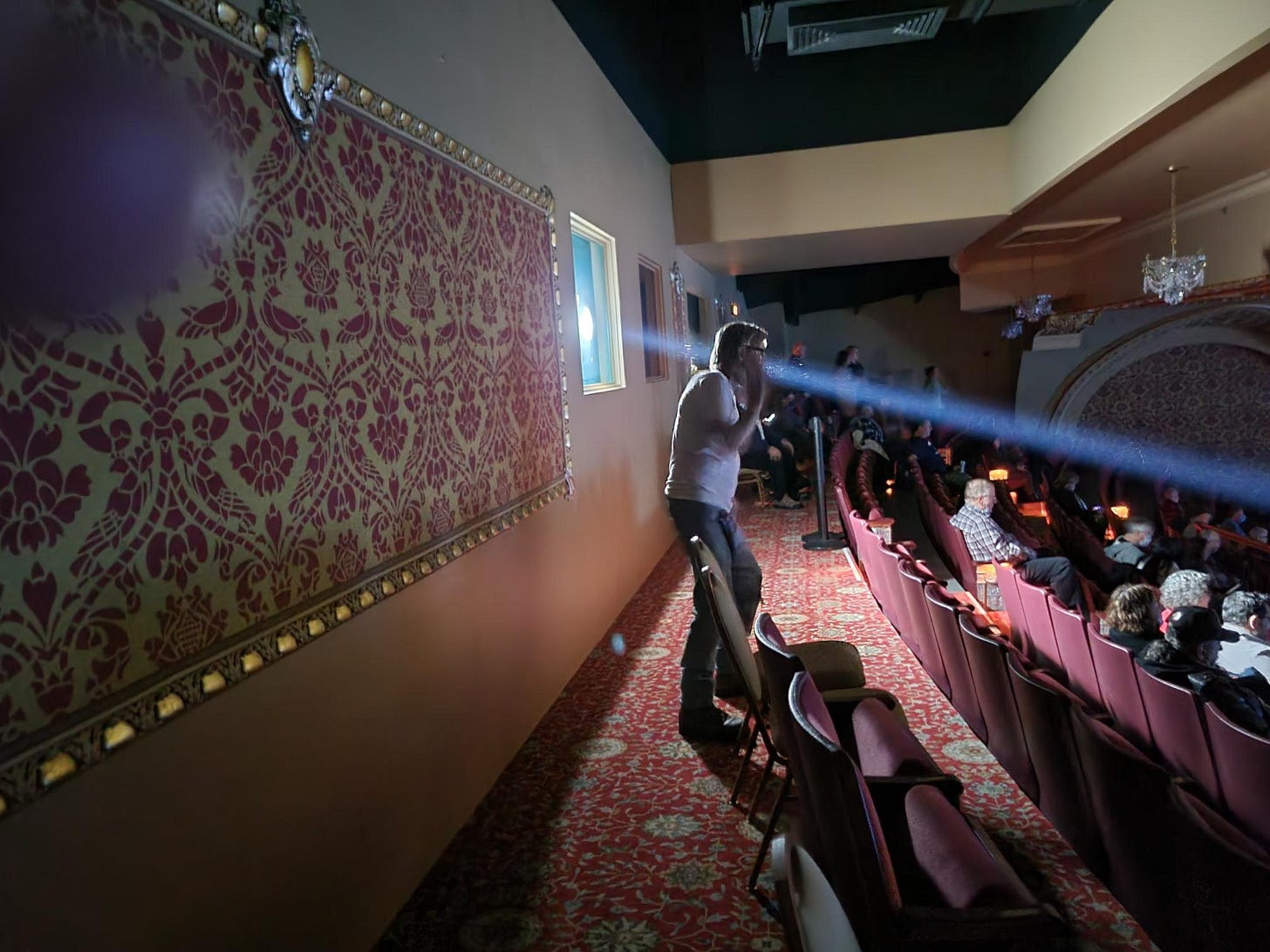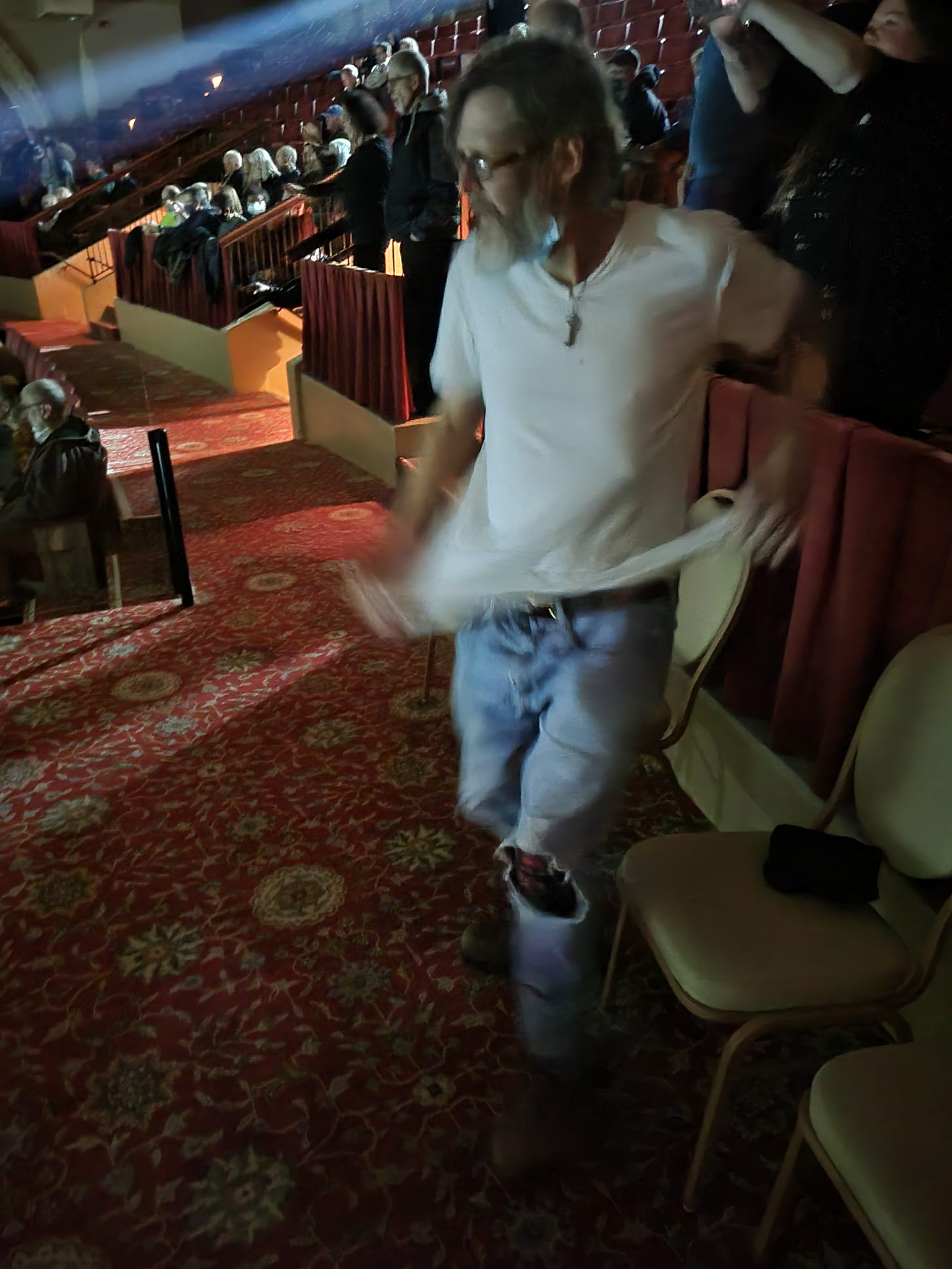`Mama Told Me Not to Come’
My unforgettable, very nearly regrettable evening at a Three Dog Night concert with my highly intoxicated brother Phil.
Last month, in my previous Brother Love series of columns, I related the story of the hours leading up to my brother Phil checking into a Chicago drug-and-alcohol rehabilitation program in April 2021.
With this column, we turn the calendar eight months ahead, to the evening of December 17, 2021.
By that point, Phil had been living in a studio apartment on Chicago’s North Side, in Edgewater, for seven months.
The housing, obtained through a not-for-profit organization that partnered with the treatment facility, was a salvation for Phil. For eight years, he had been without permanent housing, squatting in abandoned spaces, sleeping on trains, making his way back to a tattered tent he’d established in a wooded area.
The 30-day rehab didn’t stick. Within hours of checking out of the facility and into the apartment, Phil resumed drinking. By the next week, he was back using heroin.
The not-for-profit laid out the plan for Phil: within a few months, the idea was that he’d gain financial footing and begin to chip in a fraction of the funds required to cover his rent payment. From there, he’d gradually increase his contribution until he was completely paying his own way.
As it turned out, in his two years there, Phil never paid a penny toward the housing; the not-for-profit fully absorbed the bill.
In Phil’s mind, he never had a shot to gain traditional employment.
To this day, he bitterly recalls the 180-degree turn made by a hardware shop manager near his apartment. Phil stopped in a few days after moving into the neighborhood. At first, upon learning Phil’s background as a carpenter and all-around handyman, the manager expressed strong interest, according to Phil.
Next came the written application, on which Phil disclosed a drug-related conviction from over 20 years earlier. The manager’s interest evaporated.
“That’s my lesson for being honest,” Phil ruefully told me.
Not long thereafter, discouraged by his fruitless traditional job search, Phil returned to a heavily traveled intersection in Oak Brook.
Before rehab, he had occasionally panhandled there; this time, he staked a regular three- or four-hour shift on a nearly daily basis.
A portion of what he collected from kindly motorists went straight to his train and bus fare—his 2 1/2-hour commute, each way. The bulk of this intersection income, though, went toward the two longstanding mainstays of Phil’s diet: booze and heroin.
It’s there, at that intersection, where we pick up this Brother Love story…
`Mama Told Me Not to Come’
It’s a frigid Friday evening in the middle of December, in the middle of America, when I locate my brother at his workplace: the middle of an intersection.
The clock reads 7 p.m. and Phil has been panhandling for three hours at his usual six-days-a-week spot, a busy intersection just southwest of the Oakbrook Center shopping mall.
Whereas the benevolence of motorists is usually converted into booze, drugs and other miscellany, on this occasion it is earmarked for the Three Dog Night concert that Phil has been enthusiastically mentioning to me for the past few months.
Until this afternoon, I hadn’t taken his remarks all that seriously.
On the one hand, Phil rarely plans his life more than a few hours in advance—so it’s encouraging that he has had this date on the calendar for a considerable time. It strikes me that, for Phil, seeing Three Dog Night would represent the achievement of something significant—beyond the joy of hearing one of his favorite bands.
On the other hand: a chief reason why Phil rarely plans his life more than a few hours in advance is the stranglehold of his never-ending pursuit of intoxicating substances. That quest makes for a much less-than-reliable individual, prone to dropping out of sight and sound for weeks at a time.
So, shortly after 1 p.m. Friday, when he mentions the concert again in a text, I contact The Genesee Theater in Waukegan. Plenty of tickets are still available for the band that peaked in the 1970s, so I tell Phil that we should go.
Over the ensuing hours, he updates me on his progress. By 4 p.m., he’s “at work.” Around 4:30, he texts, “I am working this crowd like nothing else. I got $45 already. Trying to get the money for your ticket too.”
At 5:30, he calls to say he will soon take a bus to meet me near my home. But an hour later, unsure if he’s actually gotten aboard, I text back that I’ll go pick him up in Oak Brook, which is 10 miles from my place. I ask: where precisely are you?
Rather than provide a clear answer, Phil sends 27 texts in less an hour.
The flurry grows in hostility and incoherence as he veers from topic to topic: angst over a bathroom renovation project years ago from which I hired, then fired him; references to our parents, Costa Rica and Bermuda; and a stern warning that I “best not have bought these tickets ‘cuz I’m not going without my fair share for the money.”
Other than the “fair share” remark, a casual observer might think Phil is trying to sabotage our evening’s plans. Indeed, I suspect that may be exactly what he is up to, on a conscious or subconscious level. For decades he has become a master in self-sabotage—so much so that I have stopped the chicken-and-egg headache of trying to discern cause from effect.
Instead, I have opted to love Phil without enabling his addictions. And on this night, I am hoping that the loving thing to do is get us to the Three Dog Night concert. I also realize this may be one colossally bad idea.
At that mental crossroads, I resolve to pick him up and gird myself for whatever may come next: proceed to the concert, take him home to his apartment 45 minutes away in Chicago, or only God knows what else in between.
*******
When I reach the intersection, I see Phil standing along one of the medians. I honk my horn to get his attention, then pull into a nearby parking lot. He trots over, lugging his cardboard-illustrated panhandle sales pitch (“Hope Will Abound”) and a backpack that includes bottles of soda laced with vodka.
I have opted to love Phil without enabling his addictions. And on this night, I am hoping that the loving thing to do is get us to the Three Dog Night concert. I also realize this may be one colossally bad idea.
“You didn’t read any of my texts, did you?” he blurts out.
“No,” I lie. “I’ve been driving.”
“OK, good. Don’t read them,” he insists. “Delete them off your phone.”
As expected, he’s exceedingly drunk, well into his second fifth of vodka for the day. My GPS tells me the theater is a 53-minute drive away; the show is slated to begin in 60 minutes. Phil rambles just about the entire time, pausing only to swig his boozy concoction, to stuff $51 in crumpled-up currency in my glove compartment (to cover his ticket, plus gas money, he explains), and to confirm that it’s OK for him to snort heroin.
“As long as you don’t make me snort it,” I answer.
My wit elicits a chuckle from him.
At the theater, balcony tickets in hand, we arrive just as the opening act, Jay Psaros, takes the stage. Turns out Psaros hails from Weymouth, Mass., a Boston suburb only a few miles from where we grew up. Phil bellows, “Somerville!”—a reference to our first hometown, and Psaros acknowledges the shoutout.
It’s the high point of their interaction.
Reeking of booze, Phil adds boisterousness to the mix. He talks loudly during and in between songs, noting that he came to see Three Dog Night, not this guy. A Deadhead who attended scores of Grateful Dead concerts back in the 20th century, Phil is more accustomed to wide-open, outdoor venues, not this kind of intimate setting.
I repeatedly try to shush him; Phil repeatedly erupts, “Am I embarrassing you?”
Most in attendance are over 60 years old, and everyone is seated. The main floor of the 2,403-seat venue is packed, but only the first several rows of the balcony are occupied.
Folks nearby politely pretend not to be bothered by the Baron brothers’ feuding, but it’s obvious that our excursion holds a great likelihood of not ending well. Looking over my shoulder, I scan the balcony’s top 10 rows—all gloriously empty for the entire stage-right side of the theater.
This buffer, I figure, is our only shot of getting out of people’s way and enabling us to stay. After returning from a futile search for a liquor store in between acts, Phil quickly seconds my motion that we move up there just as Three Dog Night takes the stage.
Ensconced in this corner of The Genesee, we stand and dance to the music—Phil bouncing along the back wall, careening again toward me, tugging a fistful of my sweater in his hands, directing me to take photos and video of his gyrations.
*******
The next hour, I try to balance enjoying Three Dog Night with containing Phil in this sort of grown-up playpen area for out-of-control middle-aged party animals. Meantime, my brother is on an emotional rollercoaster.
He rides waves of euphoria as he allows songs like “Never Been to Spain” and “Shambala” to course through him. About midway through the concert, he descends into tears and despair. Taking a seat, he says that he doesn’t know if he will be able to stay much longer.
Standing behind him, I wrap my arms around his chest, and he grasps my hands. After about a minute, Phil is back on his feet, looking for the cap to his bottle of booze. He gets on his hands and knees, deploying his phone flashlight to search the top few rows. Unsteadily back up, he orders me to finish my bottle of water, so that he can use the receptacle for his booze.
The next hour, I try to balance enjoying Three Dog Night with containing Phil in this sort of grown-up playpen area for out-of-control middle-aged party animals. Meantime, my brother is on an emotional rollercoaster.
The teeter-tottering of good and bad moments come ever more rapidly.
Between both of us, joy and tenderness give way to anger and tension. I am hoping we can hang on to the end, though I am also tempted to get out of there before something epically horrible happens. About 50 minutes into the 70-minute set, “Mama Told Me Not to Come” becomes the most fitting song yet.
That’s when Phil, a veteran of at least two near-fatal tumbles onto train tracks in the past year and who once busted up a bunch of ribs falling off a roof, makes his way down the darkened stairs.
During “Shambala” (see the 11-second video above), he had talked about trying to get down to the stage. This was his move. I issue a silent prayer that things don’t get any uglier and ease out a back balcony exit to see if I can intercept him.
*******
About a minute later, in the balcony lobby, I see a few ushers have intercepted Phil. To my relief, he seems calm. The situation appears to be under control. They hand him off and he resumes his fistful-of-sweater routine, practically ripping it off my body while ordering me to lead him back to a seat.
An usher shadows our steps, this unwelcome spotlight now upon us. We find seats toward the front of the balcony, and the usher advises us firmly that we should stay seated.
“Celebrate” and “Joy to the World” close the show, and Phil can’t help but get back on his feet for that last number. I begin rolling video for the 12th time, just as Phil stumbles back into his chair.
“Ha,” he chortles, rising again. “I fell.”
“All right,” I reply nervously. “Stay close.”
A few minutes later, to my utter relief, the show ends. We exit without incident; I hold my breath the entire time.
The next day, I send Phil a few photos and video clips, including the final one of him sprawling backwards as “Joy to the World” rains down on us. I text him: “Chair with the save here…”
“Truly a great time,” Phil responds. “Will never forget that. Hope I wasn’t too much of an ass.”
Throughout the night, Phil periodically would marvel that it had been 26 years since he had last attended a concert. When Jerry Garcia died, so did Phil’s penchant for these events. The day after this one, Phil is already looking forward to the next one.
“Definitely have to do that again maybe next week we’ll find another one,”1 he texts later. “Love you brother.”
We have not gone to another concert. At least, not yet. “Three Dog Night” is coming back to the area in six weeks.






